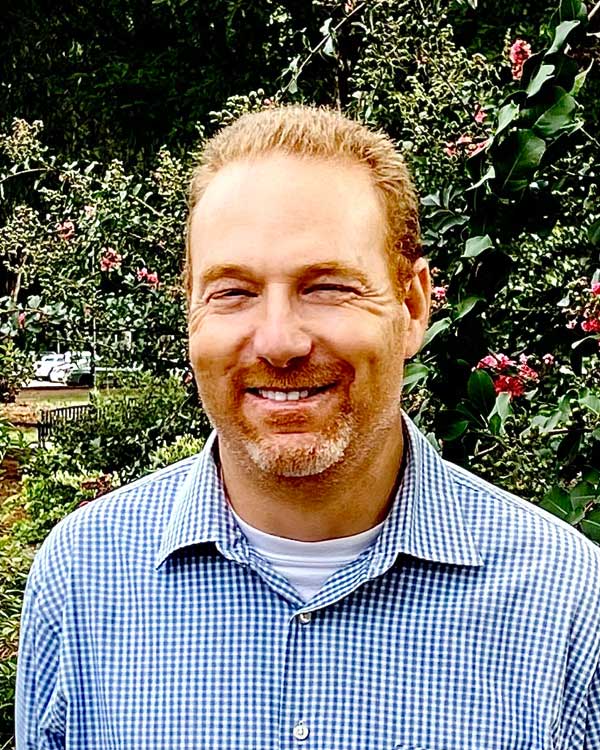Show your commitment to helping people live healthier lives by promoting physical activity in public health practice.
Concentration in:
Physical Activity and Health
Master of Public Health
Is physical inactivity the greatest threat to public health in the US?
According to the Centers for Disease Control and Prevention (CDC), chronic diseases (such as heart disease, diabetes and cancer) are now responsible for the greatest proportion of deaths in the United States and worldwide. Despite strong evidence that physical inactivity is significantly linked to chronic disease, the vast majority of individuals in the U.S. do not meet the minimum physical activity recommendations for health.
NCWU’s online Master of Public Health (MPH) program, with a concentration in Physical Activity and Health, is designed to equip graduate students with the knowledge and skills to incorporate physical activity into the core of public health practice in order to improve the health of individuals, communities, and populations. The online MPH program in NC is designed to train students as public health professionals, who are able to integrate the health-promoting concepts of physical activity into public health programs, interventions, and policies.
We offer an accelerated MPH (15-month program) and an extended MPH program (27-month program).
The Extended MPH Program allows students to take one class per 8-week sub-term (2 classes per semester) for seven semesters (~2.5 years). The Extended MPH Program offers students an option to complete the MPH at a less accelerated pace, which may be more attractive to students with other heavy commitments (full-time work, full-time caregiving, etc.)
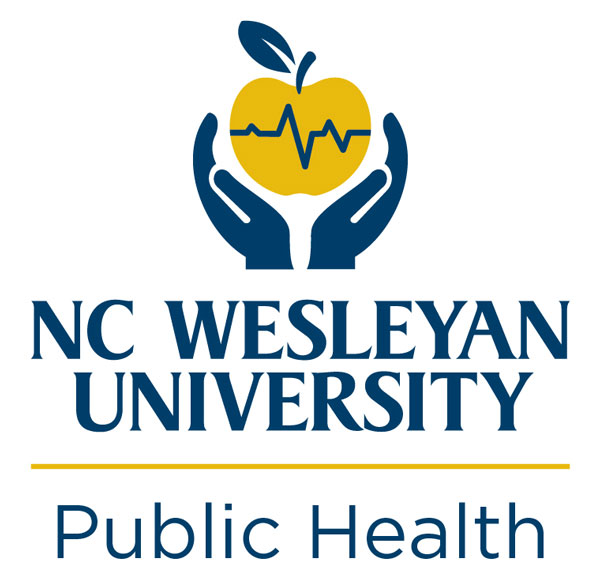
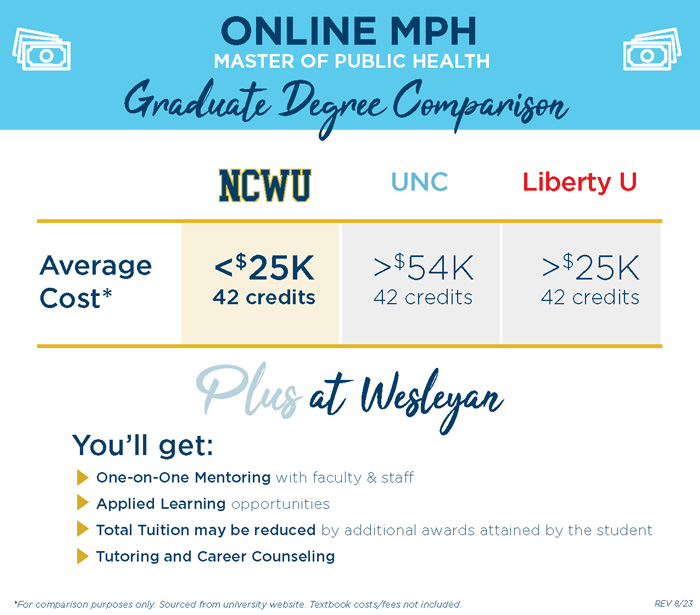
One of the Most Affordable Online MPH Programs in the Southeast
The NCWU online MPH graduate program is one of the most unique degrees in NC! The Master of Public Health we offer includes concentrations in physical activity and health. Plus, it’s one of the most affordable compared to other programs in the southeast. This 42-credit hour graduate program is taught by world-class faculty and includes one-on-one mentoring with faculty & staff, applied learning opportunities, low tuition, and tutoring and career counseling.
Explore the MPH degree TODAY and begin your journey to integrating the health-promoting concepts within your industry.
Graduate students in the Master of Public Health (MPH) program will learn how to incorporate effective physical activity programs and policies into public health practice using their understanding of:
- Health effects of physical activity
- The scientific basis for current public health physical activity guidelines for individuals across different age, sex, racial, and ethnic groups
- Major social determinants of health and their impacts on physical activity behavior
- Roles of multiple stakeholders in physical activity-based program planning, implementation, and evaluation
- Health behavior and its influence on physical activity participation and programming
- Measurement and surveillance techniques used to assess physical activity at the population level
- Application of epidemiological methods to a breadth of settings and situations in public health practice
- The core functions of public health
- Cultural competence in communicating public health content
A major focus of NCWU’s online Master of Public Health program is to connect students to practical, hands-on experiences in public health, by working directly with community partners. In this manner, students have the opportunity to apply the knowledge and skills gained in their Master of Public Health courses to “real world” public health practice, while simultaneously helping to improve the health of our communities. During the online MPH program, students have the opportunity to complete their public health practicum in one of a variety of public health-related sites such as community centers, parks and recreation departments, government and non-profit organizations, grass-roots organizations, public health research, university wellness centers, large healthcare systems, schools, and others.
Wesleyan’s online Master of Public Health Program is the only one in North Carolina to offer a concentration in physical activity and health.
Master of Public Health Features & Highlights:
Convenient
Take classes from anywhere! The MPH program is 100% online in accelerated 8-week terms.
Practical
Students gain practical hands-on experience at public health-related agencies and obtain health-related national certifications as part of their MPH program at NCWU..
Affordable
NCWU’s graduate tuition rates are extremely competitive compared to other graduate schools in the U.S.
Experienced
Our engaging faculty have real-world professional experience to ensure you are challenged and supported through practical coursework.
Master of Public Health Program Overview
Requirements for Master of Public Health:
- An undergraduate degree (submit official transcripts from all colleges/universities)
There is no pre-requisite undergraduate degree to apply for this program, however, a strong interest in, or background/education in public health or a related field (exercise science, health promotion, healthcare administration, biomedical sciences, health psychology, nursing, others) is encouraged. - Resume with two references
(Must be able to provide reference letters upon request) - Complete a statement of purpose (personal essay)
- No GRE required
- Minimum undergraduate GPA 2.7
Note: Graduate school applicants with a cumulative GPA of 2.5-2.7 may still be considered based upon other factors submitted in the application.
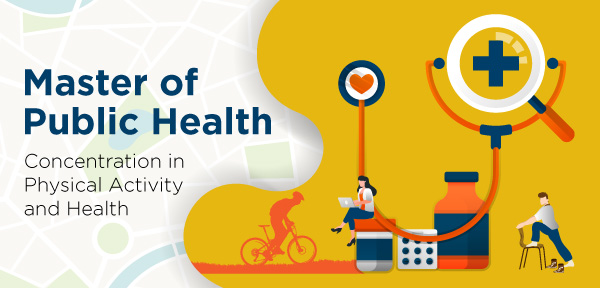
Application Deadline for Master of Public Health
Fall Semester: August 4th

Are online MPH programs worth it?
Graduate students in the Master of Public Health program will learn how to incorporate effective physical activity programs and policies into public health practice using their understanding of:
- Health effects of physical activity
- The scientific basis for current public health physical activity guidelines for individuals across different age, sex, racial, and ethnic groups
- Major social determinants of health and their impacts on physical activity behavior
- Roles of multiple stakeholders in physical activity-based program planning, implementation, and evaluation
- Health behavior and its influence on physical activity participation and programming
- Measurement and surveillance techniques used to assess physical activity at the population level
- Application of epidemiological methods to a breadth of settings and situations in public health practice
- The core functions of public health
- Cultural competence in communicating public health content
Get Certified!
Students will have the opportunity to obtain a public health-related national certification (such as the NBPHE Certified in Public Health, NCHEC Certified Health Education Specialist, or the ACSM/NPAS Certified Physical Activity in Public Health Specialist) as part of their MPH program at NCWU.
Applied Learning With Our Community Partners
A major focus of NCWU’s Master of Public Health program is to connect students to practical, hands-on experiences in public health, by working directly with community partners. In this manner, students have the opportunity to apply the knowledge and skills gained in their MPH courses to “real world” public health practice, while simultaneously helping to improve the health of our communities. During the MPH program, students have the opportunity to complete their public health practicum in one of a variety of public health-related sites such as community centers, parks and recreation departments, government and non-profit organizations, grass-roots organizations, public health research, university wellness centers, large healthcare systems, schools, and others.
You will learn from world-renowned and accomplished faculty that mentor students through the latest research and practical applications in public health.
NCWU Exercise Science, Health Promotion, and Master of Public Health students gain practical hands-on experience, working with the following community partners, as part of their curriculum at NCWU.
- Harrison Family YMCA
- Boys and Girls Club of the Tar River Region
- Manual Physical Therapy
- Cora Physical Therapy
- City of Rocky Mount
- Nash County Schools, Occupational Therapy
- Vidant Health Occupational Therapy
- Nash UNC Cardiopulmonary Rehabilitation
- Ripe for Revival
- Rocky Mount Senior Center
- Nash-Rocky Mount Schools Athletic Department
- Brekenridge Retirement Center
- Rocky Mount Academy
- Rocky Mount Parks and Recreation, Athletics Division
- NCWU Health Center
- NCWU Athletic Training
- Wesleyan Wellness, NCWU
- NCWU Tennis
The Master of Public Health (MPH) program at North Carolina Wesleyan University (NCWU) includes core public health courses and a concentration in physical activity and health. The MPH program is comprised of 42 graduate-level credit hours, including 20 hours of core public health courses, 15 hours of concentration-specific courses, and 7 hours of experiential and integrated learning courses.
After admission, students enter the MPH program during the Fall semester, and complete four semesters (~15 months) of MPH coursework (see course sequence below). All NCWU MPH course requirements must be completed within 5 years of the start of the student’s MPH program.
A maximum of 21 graduate-level hours may be transferred into the MPH program if approved.
MPH 15-Month Program Course Sequence: |
|||
| Fall Year 1 | Spring Year 1 | Summer |
Fall Year 2 |
| PBH 500: Foundations in Public Health (3 SH) [Fall A] |
PBH 510: Quantitative & Qualitative Methods in Public Health (3 SH) [Spring A] |
PBH 535: Program Evaluation & Measurement (3 SH) [Summer 1] Pre-req: PBH 500; PBH 510 |
PBH 610: Community Physical Activity Interventions (3 SH) [Fall A] Pre-req: PBH 530; PBH 535; EXS 600 |
| PBH 525: Public Health Policy, Management, & Leadership (3 SH) [Fall A] Pre-req or co-req: PBH 500 |
PBH 540: Healthcare Systems (2 SH) [Spring A] Pre-req: PBH 500 |
EXS 600: Assessment in Physical Activity & Health (3 SH) [Summer 2] Pre-req: EXS 500 |
PBH 620: Public Health Practicum (3 SH)* [16 weeks: Fall A & B] Pre-req: PBH 500; 510; 515; 520; 525; 530; 535 (pre or co-req); 540 (pre or co-req); EXS 500 |
| EXS 500: Exercise Physiology in Context (3 SH) [Fall B] |
PBH 530: Program Planning & Implementation (3 SH) [Spring B] Pre-req: PBH 500 |
PBH 600: Physical Activity & Public Health (3 SH) [Summer 2] Pre-req: PBH 500; EXS 500 |
PBH 615: Public Health Integrative Seminar (3 SH) [Fall B] Pre-req: PBH 500; 510; 520; 525; 530; 535; 600; 610; EXS 500 & 600 |
| PBH 515: Physical Activity & Behavior (3 SH) [Fall B] Pre-req: PBH 500 |
PBH 520: Epidemiology (3 SH) [Spring B] Pre-req: PBH 500; PBH 510 |
PBH 620: Public Health Practicum (3 SH)* [16 weeks: Summer 1 and 2] Pre-req: PBH 500; 510; 515; 520; 525; 530; 535 (pre or co-req); 540 (pre or co-req); EXS 500 |
PBH 625: Professional Preparation in Public Health (1 SH) [Fall B] Pre-req: PBH 500; 510; 515; 520; 525; 530; 535; 540; 600; 610; EXS 500 & 600 |
|
Total: 12 SH |
Total: 11 SH | Total: 9-12 SH |
Total: 7-10 SH |
*Accelerated MPH students will be assigned to take PBH 694: Public Health Internship during either Summer (year 1) or Fall (year 2) of their MPH program. Semester assignment for PBH 694 will be determined by the student’s faculty advisor, in consultation with the MPH program director.
4 +1 Integrated MPH Program Course Sequence: |
||||
| Undergraduate Fall | Undergraduate Spring | Graduate Summer | Graduate Fall |
Graduate Spring |
| PBH 500: Foundations in Public Health (3 SH) [Fall A] |
PBH 510: Quantitative & Qualitative Methods in Public Health (3 SH) [Spring A] |
PBH 535: Program Evaluation & Measurement (3 SH) [Summer 1] Pre-req: PBH 500; PBH 510 |
PBH 610: Community Physical Activity Interventions (3 SH) [Fall A] Pre-req: PBH 530; PBH 535; EXS 600 |
PBH 540: Healthcare Systems (2 SH) [Spring A] Pre-req: PBH 500 |
| EXS 500: Exercise Physiology in Context (3 SH) [Fall B] |
PBH 530: Program Planning & Implementation (3 SH) [Spring B] Pre-req: PBH 500 |
PBH 520: Epidemiology (3 SH) [Summer 1] Pre-req: PBH 500; PBH 510 |
PBH 525: Public Health Policy, Management, & Leadership (3 SH) [Fall A] Pre-req or co-req: PBH 500 |
PBH 620: Public Health Practicum (3 SH)** [16 weeks: Spring A & B] Pre-req: PBH 500; 510; 515; 520; 525; 530; 535 (pre or co-req); 540 (pre or co-req); EXS 500 |
| EXS 600: Assessment in Physical Activity & Health (3 SH) [Summer 2] Pre-req: EXS 500 |
PBH 615: Public Health Integrative Seminar (3 SH) [Fall B] Pre-req: PBH 500; 510; 520; 525; 530; 535; 600; 610; EXS 500 & 600 |
|||
| PBH 600: Physical Activity & Public Health (3 SH) [Summer 2] Pre-req: PBH 500; EXS 500 |
PBH 515: Physical Activity & Behavior (3 SH) [Fall B] Pre-req: PBH 500 |
PBH 625: Professional Preparation in Public Health (1 SH) [Spring B] Pre-req: PBH 500; 510; 515; 520; 525; 530; 535; 540; 600; 610; EXS 500 & 600 |
||
|
Total: 6 SH |
Total: 6 SH | Total: 12 SH | Total: 12 SH |
Total: 6 SH |
Extended (27-month program) MPH Program Course Sequence: |
||||||
| Fall Year 1 | Spring Year 1 | Summer Year 1 | Fall Year 2 | Spring Year 2 | Summer Year 2 |
Fall Year 3 |
| PBH 500: Foundations in Public Health (3 SH) [Fall A] |
PBH 510: Quantitative & Qualitative Methods in Public Health (3 SH) [Spring A] |
PBH 535: Program Evaluation & Measurement (3 SH) [Summer 1] Pre-req: PBH 500; PBH 510 |
PBH 525: Public Health Policy, Management, & Leadership (3 SH) [Fall A] Pre-req or co-req: PBH 500 |
PBH 540: Healthcare Systems (2 SH) [Spring A] Pre-req: PBH 500 |
PBH 620: Public Health Practicum (3 SH) [16 weeks: Summer 1 and 2] Pre-req: PBH 500; 510; 515; 520; 525; 530; 535 (pre or co-req); 540 (pre or co-req); EXS 500 |
PBH 610: Community Physical Activity Interventions (3 SH) [Fall A] Pre-req: PBH 530; PBH 535; EXS 600 |
| EXS 500: Exercise Physiology in Context (3 SH) [Fall B] |
PBH 530: Program Planning & Implementation (3 SH) [Spring B] Pre-req: PBH 500 |
PBH 600: Physical Activity & Public Health (3 SH) [Summer 2] Pre-req: PBH 500; EXS 500 |
PBH 515: Physical Activity & Behavior (3 SH) [Fall B] Pre-req: PBH 500 |
PBH 520: Epidemiology (3 SH) [Spring B] Pre-req: PBH 500; PBH 510 |
EXS 600: Assessment in Physical Activity & Health (3 SH) [Summer 2] Pre-req: EXS 500 |
PBH 615: Public Health Integrative Seminar (3 SH) [Fall B] Pre-req: PBH 500; 510; 520; 525; 530; 535; 600; 610; EXS 500 & 600 |
| PBH 625: Professional Preparation in Public Health
(1 SH) [Fall B] Pre-req: PBH 500; 510; 515; 520; 525; 530; 535; 540; 600; 610; EXS 500 & 600 |
||||||
|
Total: 6 SH |
Total: 6 SH | Total: 6 SH | Total: 6 SH | Total: 5 SH* | Total: 6 SH |
Total: 7 SH |
*In consultation with their faculty advisor, students in the extended MPH program may be able to take a one-credit hour special topics or research topics course, if needed to maintain full-time graduate student status in Spring, Year 2.
The Integrated 4+1 Master of Public Health (MPH) allows undergraduate students from North Carolina Wesleyan University to graduate with both a bachelor’s degree and a Master’s in Public Health degree in five years. The integrated 4+1 MPH option is intended for highly motivated undergraduate students interested in pursuing an MPH degree after their undergraduate program. The 4+1 option allows students to complete their undergraduate and graduate degrees in five years (vs. the typical 6 years). Students also save tuition dollars because they pay the undergraduate tuition rate for the first year of the MPH program.
To be eligible for the Integrated 4+1 MPH option, students must meet the following requirements:
- Students must apply to the integrated 4+1 MPH program by April 31st of their Junior year of their undergraduate program at NCWU.
- Students must be working to complete their undergraduate degree, be in good academic standing, and have a minimum cumulative GPA of 3.0 at the time of application.
- Students must be on track to graduate in the year following application to the integrated 4+1 MPH option.
- Students must earn a minimum final grade of C in any course to pass the course.
- No more than two grades of a C may be applied to the MPH degree.
- Students must submit the Integrated MPH program advising form, which is available on the MPH program website, signed by their undergraduate academic advisor, by April 31st of their Junior Year. This form must clearly show all courses to be attempted (including both undergraduate and MPH graduate courses) during their senior year of their undergraduate program.
After acceptance into the Integrated 4+1 MPH program, students take 12 credits of graduate level MPH courses (6 credits in the Fall, and 6 credits in the Spring) during their senior year of their undergraduate program, along with any remaining courses required to complete their bachelor’s degree. Upon receipt of their undergraduate degree, and successful completion* of the first year MPH program courses, students then take the remaining MPH courses during the Summer, Fall, and Spring semesters following their undergraduate degree program.
There are numerous opportunities in Public Health and graduates are in high demand at local and state governmental organizations, foundations, educational institutions, private health agencies, and research centers.
Graduates of NCWU’s MPH in Physical Activity and Health find careers in the following sectors:
Career Options:
- University/College Health and Wellness
- Corporate Health and Wellness
- Transportation and Community Design
- Parks and Recreation
- Chronic Disease Prevention
- Community-based Physical Activity Interventions
- Policy and Environmental Change
- Local and State Health Departments
- Non-profit and grass-roots organizations
- Hospitals and Healthcare Clinics
- Childhood and Adolescent Health and Wellness (schools, after-school programs, etc.)
Why should a student pursue this program? What makes it unique?
Public health is a multi-disciplinary, and fast-growing field, and the many areas of public health are experiencing rapid employment growth. The area of physical activity and health, in particular, is emerging as a major public health focus, in part, due to the recognition that physical inactivity is an established risk factor for premature mortality and chronic disease. Despite strong evidence that physical inactivity is health-damaging, getting individuals and communities to be physically active is a complex and challenging problem. According to the Centers for Disease Control (CDC), more than 25% of U.S. adults are not physically active enough to protect their health. What is unique about our program, is that the curriculum is designed to teach students how to integrate the health-promoting concepts of physical activity into the core of public health practice. In this manner, graduates of this program will be uniquely poised to address this top public health priority area (physical activity and health), in order to improve the health of individuals and communities.
What are the job prospects with this degree?
According to the CDC, there are more than 170 public health job categories, so there is something for everyone in public health! Below are just a few example areas of the many career opportunities in this field.
- University/College health and wellness
- Corporate health and wellness
- Transportation and community design
- Parks and recreation
- Chronic disease prevention
- Community-based physical activity interventions
- Policy and environmental change
- Local and state health departments
- Non-profit and grass-roots organizations
- Hospitals and healthcare clinics
- Childhood and adolescent health and wellness (schools, after-school programs, etc.)
Does a student’s undergraduate degree have to be related to this field? Are there pre-requisites for this program?
Because public health brings together individuals with diverse educational backgrounds, there is no pre-requisite undergraduate degree to apply for this program. However, a strong interest in, or background/education in public health or a related field (exercise science, health promotion, healthcare administration, biomedical sciences, health psychology, nursing, others) is encouraged.
What undergraduate GPA do I need to apply to this program?
Students must have earned a baccalaureate degree, or it’s equivalent, from an institution accredited by an agency recognized by the U.S. Department of Education, with a minimum of a 2.7 overall GPA (on a 4.0 scale).
Students who have earned a baccalaureate degree, or its equivalent, from an institution accredited by an agency recognized by the U.S. Department of Education, with a minimum of a 2.5 overall GPA (on a 4.0 scale) may be conditionally admitted. Conditional admissions status allows students to enter the MPH program under the condition that they take and pass (with a B- or greater) PBH 500: Foundations in Public Health, and PBH 510: Quantitative and Qualitative Methods in Public Health in order to continue in the MPH program.
Does this program require a graduate record examination (GRE) for admission?
The GRE is not required for admission to this program.
Are the courses for this program synchronous or asynchronous?
Courses are 100% online. The majority of coursework will be asynchronous, however, most courses in this program will require some synchronous meetings in order to foster peer discussion, feedback, and review with the faculty instructor.
Are there any on-campus requirements such as on-campus meetings, orientation, etc.?
All courses and program-related content (such as orientation) are conducted online, so there is no requirement to attend any program content on campus.
Is there an opportunity for hands-on experience during this program?
Students are required to complete a 150-hour practicum field experience at a public health-related site/agency under the supervision of a preceptor and NCWU MPH faculty. The practicum course is designed to provide MPH students with the opportunity to integrate the knowledge and skills developed during their academic program in a structured, supervised, real-world professional setting in a public health-related field, under the direction of a site supervisor (preceptor).
Does this program require a graduate thesis?
A graduate thesis is not required for this program. Instead, students complete their culminating public health integrative learning experience as a comprehensive exam and national public health certification.
How long will it take to complete the MPH program?
Students complete the program over the course of Fall, Spring, Summer, and one additional Fall semester, for a total of about 15 months.
Master of Public Health Graduate Student Handbook
A resource designed to help guide you throughout your MPH program at NCWU. Important information about academic policies, procedures, and degree requirements for the MPH program are contained throughout the handbook.
4+1 Integrated MPH Program Advising Form
Use this form if you are a student who has been conditionally accepted into the Integrated 4+1 MPH Program option. Must be submitted by April 31st of Junior year.
Faculty & Staff
Email any of our advisors with any questions you have about completing this program.
Shannon Crowley, Ph.D.
Associate Professor of Public Health, MPH Program Director, Program Coordinator for Health Promotion

Shannon Crowley, Ph.D.
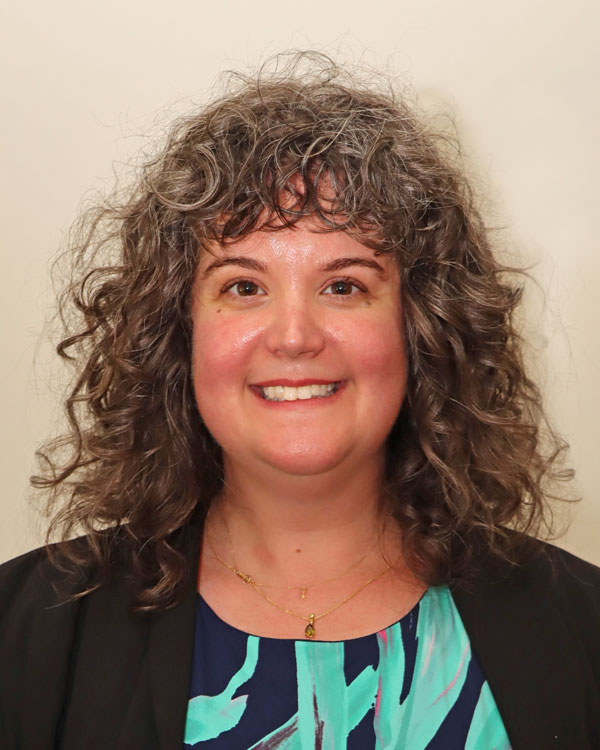
Meredith Gringle, Ph.D.
Meir Magal, Ph.D.
Inaugural Souza Professor of Exercise Science/Chair, School of Math and Science/Program Coordinator, Exercise Science
